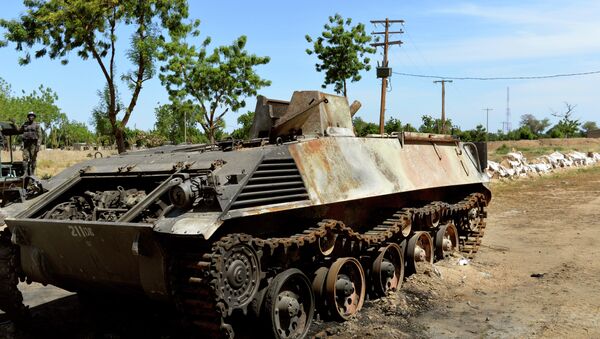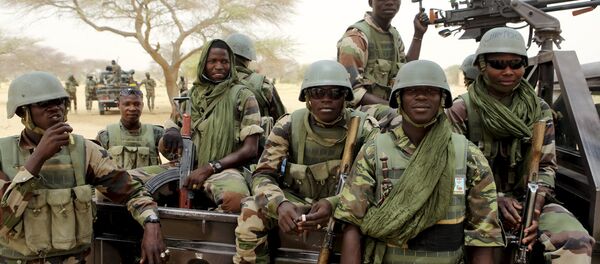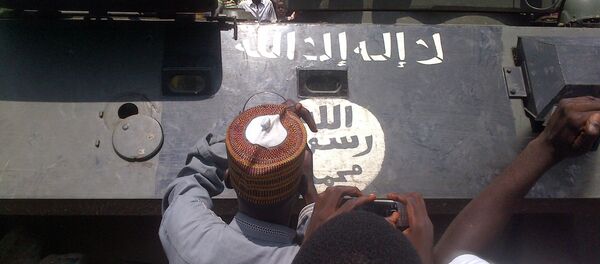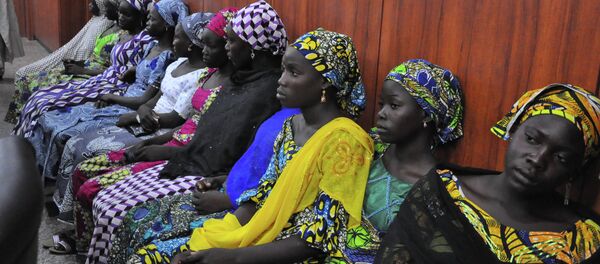Sputnik: I wanted to ask you about your participation in the VII Moscow Conference on International Security. What meetings will you have with Russian military officials and Russian leadership at the Moscow Conference on International Security?
Assomo: Thank you very much for giving me the opportunity to say a few words about our participation at this event — Moscow Conference on International Security. I am leading the Cameroonian delegation. Cameroon is a country in Central Africa and our participation at this Moscow Security Conference is at the invitation of our colleague, the Honorable Minister of Defense of the Russian Federation. And this is a great privilege and honor for our country to be part of such a high summit. We are going to work with our counterparts from the five continents all over the world who have been invited here to Moscow. And when high-level authorities dealing with security matters meet together it is a great occasion to exchange information, intelligence, and experiences concerning the ways we are mastering the security problems in our different countries and regions.
READ MORE: Analyst Reveals Real Reason Behind Boko Haram Kidnappings
We also have secondly in Cameroon a problem of two regions which have decided to take arms and to fight against the central government to get what they call their independence. It is a secessionist group which wants to divide our countries into two. And we cannot accept that, so we are fighting it since a year now. But we have no fear we will win. But what is the problem for us are the international ramifications. We have information concerning the links they have with the 04:41 region and even over the continent of Africa. So that's the point and I will have bilateral discussions with some officials, from the government of the Russian Federation and we will discuss specific and bilateral cooperation between our two countries. So our participation and our presence here in Moscow is very important for us, Cameroon.
READ MORE: Yemen Peace Proposals, Boko Haram Kidnappings, Syrian Arab Army in Manbij
Sputnik: Can you tell me specifically which Russian officials you will be meeting with during your time in Moscow?
Assomo: We will have meetings with high-ranking officials in the Ministry of Defense and the Ministry of Foreign Affairs.
Sputnik: So of course you mentioned the security issues in Cameroon regarding Boko Haram. What has been the most recent Boko Haram attack in Cameroon?
Assomo: As I told you, we are fighting Boko Haram since four years now and they are almost beaten but from time to time they operate by suicide bombs and they also kill civilian people in the villages and towns. But their last attack was four days ago, and unfortunately, we lost five soldiers. Just four days ago we lost five soldiers so we are mourning; our army is mourning the five soldiers. So it is a real and serious problem — Boko Haram, but the fight is continuing. It is in the village of Sagme, in the Far North of Cameroon.
READ MORE: Boko Haram Militants Release 100 of 110 Abducted Nigerian Schoolgirls
Sputnik: Have you located the perpetrators of the attack?
Sputnik: How many Boko Haram militants would you say are currently on the territory of Cameroon?
Assomo: It is difficult to give you a precise reply, a precise answer because the problem of Boko Haram is that they look like an army but they are not an army. So they are with the population, they are in the population and they are recruiting young people, young men, young girls, ten years, 12 years old. So they are in the population. So it is difficult for us to know that they are in that quarter or in that village. So we count on the population to give us good information concerning troubling behaviors in the society and that is what we are doing, but it is not an easy task.
Sputnik: Considering the work of the Multinational Joint Task Force against Boko Haram, should the Peace and Security Council of the African Union consider the renewal of its mandate at the end of the year?
Assomo: I can clearly say yes, because when this force was put in place it has a mandate which will theoretically come to an end at the end of this year, but since the situation is not completely solved we are negotiating with the African Union, in Addis Ababa so that they can postpone the delay of the end of the mission of this force until the end of the war against Boko Haram. So we are optimistic, that since the war is not ended, the Multinational Joint Task Force will continue its mission and we hope that we will come to a conclusion in that way with the African Union.
READ MORE: Eighteen Killed, 84 Wounded in Boko Haram Attack in Nigeria — Emergency Services
Sputnik: Are you looking for additional support from the African Union against Boko Haram that has not yet been provided?
Assomo: What I can say is that we first have to say to the African Union about what it has done, and you know that this is an international program, so they have their procedures, their protocols, their way of giving us the funds. So they have the will. Africa has the will, the African Union has the will, but the African Union has partners who are not in Africa, like Russia, like the US, like the European Union and so on and so forth, and these partners, all these partners help the African Union to assemble funds to help our force. So we are optimistic, we are thankful for what has been done until now and we know they will continue their efforts, they will continue to help us.
Sputnik: To what extent will the $5 million pledged by the Government of Japan strengthen Cameroon's security and aid vulnerable groups, such as Internally Displaced Peoples in the Far North?
Assomo: The problem with such money is that when we receive that money we have a special program, and the two partners know what we must do with any franc or any kopek that we receive. So I cannot give you details concerning what we will buy, what we will do with this money because before giving to us, Japan and us agreed on what we have to do. So there is no fear concerning the use of that money, either in our part or concerning Japan. But it's not the place to give details concerning the use of this money since the two parts, Japan and us, agreed and we know what we will do with that money and Japan is controlling the use of that money. So there is nothing to wonder about.
Sputnik: Are there any other military projects between Cameroon and Japan this year or in the near future?
Sputnik: How has the involvement of the UNHCR in the reallocation of asylum seekers due to the secessionist crisis in the North West and South West regions of Cameroon affected Cameroon's handling of the crisis?
Assomo: The UN is our partner, with specialist organizations such as the refugees organization, such as the WHO, specialist organizations of the UN system. All of them are working with us for the respect of human rights, to help the refugees or displaced persons, to help us in the education of the children of the displaced because of this crisis. I can say that the presence and the cooperation of the UN is really appreciated. We work with them and we are confident that we will continue to work with them. Today you cannot work in a country behind closed doors. It is not possible. You have to open yourself, especially to the UN if you want to something valuable. You must open your doors to the UN because they have to see what is going on… They must be there. It is a kind of humanitarian police and we are not annoyed by that. It is a good thing that they can come and witness what is going on in our country and we are working closely with the specialized organizations of the UN.
READ MORE: Boko Haram Hit-and-Run Attack Leaves Five Dead in Nigeria
Sputnik: What factors are most vital for the resolution of the crisis in the Anglophone regions?
Sputnik: Are you looking for the support of foreign countries or other organizations to deal with the separatist crisis in Cameroon?
Assomo: We are not closed to such [prospects], but when you have a friend who is in trouble, if you are a real friend, you have to go to his rescue; you don't wait for him to call and say come and help me. So that is what I can tell you. We are not asking someone to come, but if a friend, a real friend, comes and proposes to help us we will examine his offer. But we are not crying to the world, come and help us, come and help us… We are open to all the opportunities that our partners, our foreign friends can present to us, but for now we are managing the situation within Cameroon, because we say it is a Cameroonian problem.
Views and opinions expressed in this article are those of the contributor and do not necessarily reflect those of Sputnik.





